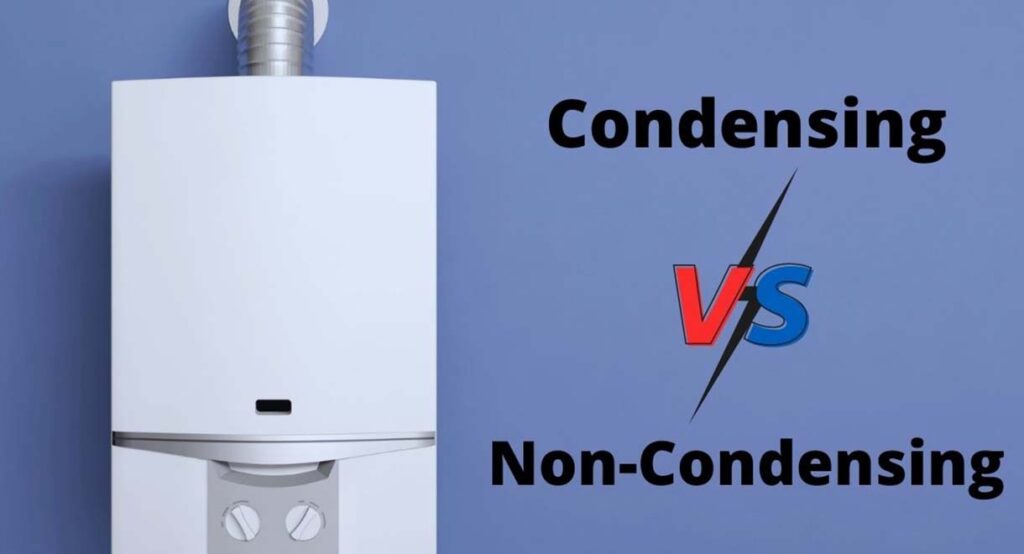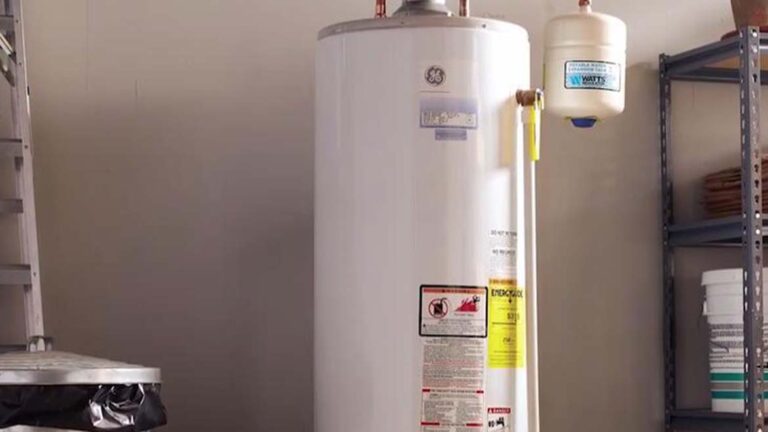It sounds a little thrilling to think about getting rid of your old, enormous, fifty-gallon water heater that takes up a lot of room in the laundry room. But you must decide whether to purchase a condensing or non-condensing water heater.
Gas-powered tankless water heaters come in two main varieties: condensing and non-condensing. Each has unique benefits and drawbacks to think about. Read this article and decide which tankless water heater is better for you.
Condensing Tankless Water Heaters
Condensing water heaters fix this flaw by using the exhaust gas to heat the water even more, as opposed to letting all that warm (but not exactly breathable) hot air escape unchecked.
How They Work
The second heat exchanger in condensing systems allows exhaust to be looped back through the system before being released. The secondary exchanger allows some of the heat from these relatively cool (usually around 100 degrees) gasses to be transferred to the incoming cold water.
The water continues on to the primary heat exchanger, where it uses a lot less energy to reach the desired temperature.
Recycling the exhaust has the pleasant side effect of causing vapor to form, which then cools and condenses to be recycled back into your water supply. This can reduce your water usage a little, but it also exposes the flaw in the system.
The Pros
Reusing the exhaust has other benefits besides reducing fuel and heating costs. Due to the high temperatures of gas system exhaust, which can reach 300 degrees, the flu system needs special materials.
As a result, the ventilation system of the water heater usually consumes a sizable portion of your investment.
In order to cool the exhaust too much lower temperatures, condensing water heaters draw heat from it. The ventilation system can now be constructed using less expensive materials. Condensing models are among the most effective options available because of their overall efficiency, which is around 90%.
The Cons
One of the major issues with a condensing tankless water heater is corrosion. Many components’ lifespans are shortened as a result of condensation. When selecting a condensing water heater, stainless steel alloys are typically the best option to combat this.

Non-condensing Tankless Water Heaters
Non-condensing models make up the vast majority of gas-powered tankless water heaters. These systems are typically the first type people pick when switching from a conventional tank model to a tankless system because they can utilize an existing ventilation system in a home.
How They Work
The steam can be vented from a non-condensing tankless water heater, where it cools off outside the appliance. Heat- and corrosion-resistant channels must be used to vent this steam. The simpler type of gas-powered tankless water heater is a non-condensing unit. As a result, it has a solitary heat exchanger.
As they leave the appliance, the exhaust gases are much hotter. When we refer to something as hot, we mean that it is hotter than 302 degrees Fahrenheit. In contrast to looping back through the heater, the gases are released directly.
The Pros
You can frequently use current fixtures when switching from a conventional tank model. This means spending less on the flu system, which is typically the most expensive component of water heater systems.
The initial cost of switching to a tankless water heater is also quite attractive because non-condensing models are less expensive than their condensing counterparts.
Their slightly smaller size and the fact that you only need to worry about professional maintenance, as opposed to other models that frequently need both DIY and professional maintenance, are two additional nice features.
The Cons
If vents are not made of sturdy, expensive material like stainless steel, the exhaust from a tankless model that is superheated can destroy the vents. If the flu system on your current water heater is outdated or constructed of less resilient materials, this entails a significantly higher investment.
The efficiency for these models is also only around 80%. While this is undoubtedly higher than many tank models currently in use, if operational costs are your top priority, there is still plenty of room for improvement.
Condensing Vs Non-condensing Tankless Water Heater
Efficiency
Condensing models perform better than their counterparts when efficiency is a concern, with a 90 percent efficiency rating as opposed to an 80 percent rating for non-condensing tankless water heaters. When compared to electric models, both options are more effective.
Environment
There are hardly any harmful vapors released into the air by either tankless water heater. Using natural gas has its disadvantages, one of which is this.
Condensing units do, however, have a significantly lower carbon footprint than any other tankless water heater that is currently available.
Investment
Condensing models typically cost more than non-condensing models because they require an additional heat exchanger. Over time, the extra components might necessitate some additional maintenance.
Even though there are long-term utility savings, some people on a tight budget might be put off by the initial investment. Non-condensing units cost less over shorter distances.
Lifespan
A gas-powered tankless water heater’s lifespan can easily exceed 20 years if it is kept up properly. It’s crucial to keep in mind that both condensing and non-condensing models have parts that will deteriorate more quickly.
For instance, the pipes that handle condensing in a condensing tankless water heater must be made of a premium, corrosion-resistant material. These might need to be replaced if they start to deteriorate.
Steam passing through the exhaust and ventilation systems of non-condensing tankless water heaters is much hotter. Over time, this may lead to deterioration and leaks.
Price
Condensing tankless water heaters typically cost more because they have an additional heat exchanger. Additionally, these extra components might necessitate more maintenance over the course of their lifespan, which will increase the cost.
While the initial investment may shock some people on a tight budget, it balances out in terms of long-term utility savings. Typically, non-condensing units are less expensive.
Final Thoughts
Condensing tankless water heaters use inexpensive venting material and are incredibly efficient (saving about 98%). They cost a little more to make, but overall they are comparable to non-condensing tankless water heaters, which are less efficient (about 80%) and need to use pricey stainless-steel venting materials.





